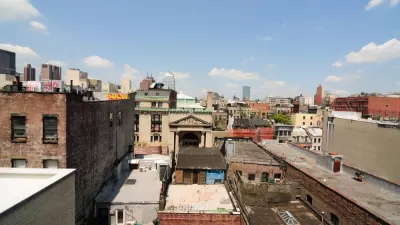Baltimore is increasing lawsuits against negligent property owners with outstanding code violations. As part of the city's "Vacants to Value" initiative, forfeited properties are transferred to receivership and auctioned to new owners.
The Vacants to Value program has multiplied the number of properties that enter receivership by about four times, according to Sherman: "In the mid-2000s, the organization appointed by the District Court to organize auctions of the forfeited properties handled about 60 each year, according to Grant Colledge, the former board president of One House at a Time. Last year, the Hampden-based nonprofit was appointed the receiver for 271…"
The Vacants to Value program launched in 2010, "after [a] 2009 city ordinance gave inspectors the power to issue tickets. Attorneys previously had go to court over violations."
"Since Vacants to Value started in late 2010, Baltimore Housing attorneys have filed nearly 1,350 receivership cases, and another 200 or so are pending, according to the city."
The ordinance allowed Baltimore Housing to "re-engineer" their code enforcement efforts, which Sherman details in the article.
FULL STORY: Auctions rise as city cracks down on code violations

Planetizen Federal Action Tracker
A weekly monitor of how Trump’s orders and actions are impacting planners and planning in America.

Maui's Vacation Rental Debate Turns Ugly
Verbal attacks, misinformation campaigns and fistfights plague a high-stakes debate to convert thousands of vacation rentals into long-term housing.

Restaurant Patios Were a Pandemic Win — Why Were They so Hard to Keep?
Social distancing requirements and changes in travel patterns prompted cities to pilot new uses for street and sidewalk space. Then it got complicated.

In California Battle of Housing vs. Environment, Housing Just Won
A new state law significantly limits the power of CEQA, an environmental review law that served as a powerful tool for blocking new development.

Boulder Eliminates Parking Minimums Citywide
Officials estimate the cost of building a single underground parking space at up to $100,000.

Orange County, Florida Adopts Largest US “Sprawl Repair” Code
The ‘Orange Code’ seeks to rectify decades of sprawl-inducing, car-oriented development.
Urban Design for Planners 1: Software Tools
This six-course series explores essential urban design concepts using open source software and equips planners with the tools they need to participate fully in the urban design process.
Planning for Universal Design
Learn the tools for implementing Universal Design in planning regulations.
Heyer Gruel & Associates PA
JM Goldson LLC
Custer County Colorado
City of Camden Redevelopment Agency
City of Astoria
Transportation Research & Education Center (TREC) at Portland State University
Jefferson Parish Government
Camden Redevelopment Agency
City of Claremont





























